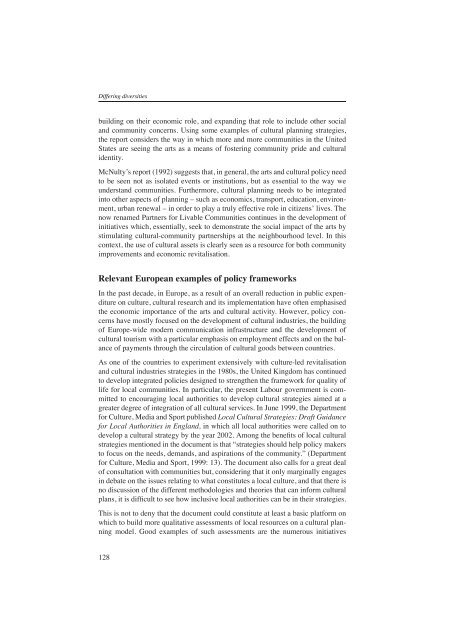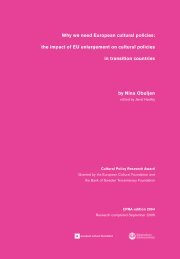<strong>Differing</strong> <strong>diversities</strong>building on their economic role, and expanding that role to include other socialand community concerns. Using some examples <strong>of</strong> cultural planning strategies,the report considers the way in which more and more communities in the UnitedStates are seeing the arts as a means <strong>of</strong> fostering community pride and culturalidentity.McNulty’s report (1992) suggests that, in general, the arts and cultural policy needto be seen not as isolated events or institutions, but as essential to the way weunderstand communities. Furthermore, cultural planning needs to be integratedinto other aspects <strong>of</strong> planning – such as economics, transport, education, environment,urban renewal – in order to play a truly effective role in citizens’ lives. Thenow renamed Partners for Livable Communities continues in the development <strong>of</strong>initiatives which, essentially, seek to demonstrate the social impact <strong>of</strong> the arts bystimulating cultural-community partnerships at the neighbourhood level. In thiscontext, the use <strong>of</strong> cultural assets is clearly seen as a resource for both communityimprovements and economic revitalisation.Relevant <strong>Europe</strong>an examples <strong>of</strong> policy frameworksIn the past decade, in <strong>Europe</strong>, as a result <strong>of</strong> an overall reduction in public expenditureon culture, cultural research and its implementation have <strong>of</strong>ten emphasisedthe economic importance <strong>of</strong> the arts and cultural activity. However, policy concernshave mostly focused on the development <strong>of</strong> cultural industries, the building<strong>of</strong> <strong>Europe</strong>-wide modern communication infrastructure and the development <strong>of</strong>cultural tourism with a particular emphasis on employment effects and on the balance<strong>of</strong> payments through the circulation <strong>of</strong> cultural goods between countries.As one <strong>of</strong> the countries to experiment extensively with culture-led revitalisationand cultural industries strategies in the 1980s, the United Kingdom has continuedto develop integrated policies designed to strengthen the framework for quality <strong>of</strong>life for local communities. In particular, the present Labour government is committedto encouraging local authorities to develop cultural strategies aimed at agreater degree <strong>of</strong> integration <strong>of</strong> all cultural services. In June 1999, the Departmentfor Culture, Media and Sport published Local Cultural Strategies: Draft Guidancefor Local Authorities in England, in which all local authorities were called on todevelop a cultural strategy by the year 2002. Among the benefits <strong>of</strong> local culturalstrategies mentioned in the document is that “strategies should help policy makersto focus on the needs, demands, and aspirations <strong>of</strong> the community.” (Departmentfor Culture, Media and Sport, 1999: 13). The document also calls for a great deal<strong>of</strong> consultation with communities but, considering that it only marginally engagesin debate on the issues relating to what constitutes a local culture, and that there isno discussion <strong>of</strong> the different methodologies and theories that can inform culturalplans, it is difficult to see how inclusive local authorities can be in their strategies.This is not to deny that the document could constitute at least a basic platform onwhich to build more qualitative assessments <strong>of</strong> local resources on a cultural planningmodel. Good examples <strong>of</strong> such assessments are the numerous initiatives128
Reasearch position paper 4created by the various Cultural Industries Development Agencies set up in the pastfive years across the United Kingdom. The cultural industries support servicesdeveloped within those agencies focus on issues <strong>of</strong> access, social inclusion andparticipation as much as on business generation. Social inclusion is here understoodas an incentive to cultural production and as a way <strong>of</strong> fostering civic pride,and a sense <strong>of</strong> local identity and ownership.The philosophy behind the above developments is that <strong>of</strong> a “productive” use <strong>of</strong>diversity to create a sustainable skills base and a culture <strong>of</strong> innovation capable <strong>of</strong>yielding economic rewards for everybody. This is an approach that sees culturaldiversity not as a problem to be controlled by top-down policies, but as an asset forthe development <strong>of</strong> the local community.Some <strong>of</strong> the developmental concerns mentioned above in relation to culture-ledurban revitalisation formed the premise for the Urban Pilot Programme, launchedby the <strong>Europe</strong>an Commission a decade ago and completed in 2000. The programmewas designed to explore new ways in which the economic potential <strong>of</strong>cities, together with their problems arising from social exclusion, industrial decay,environmental degradation, could be tackled and lessons shared throughout<strong>Europe</strong>. Although a definition <strong>of</strong> cultural diversity was not spelled out, and therewas a bias towards building-based initiatives and away from more innovativeschemes focusing on empowering, networking and skills enhancement projects,some <strong>of</strong> the projects funded managed to implement interesting examples <strong>of</strong> integratedsolutions.In Randers in Denmark and in Friedrichshain in Berlin, for instance, culture wasused as a motor for regeneration, especially to create more inclusive urban strategiesdealing with the issues raised by the multicultural background <strong>of</strong> those cities.In Randers, in particular, the Wonder project, has devoted an area <strong>of</strong> the city toeducation facilities and exhibition spaces, as well as to workshops andentrepreneurs belonging to the immigrant and refugee population (32% <strong>of</strong> thetotal). The overall aim here is to allow minorities to achieve a stronger presence onthe labour market as a base for further integration. In Turin, Italy, the Living, NotLeaving project has adopted a more cultural planning approach, with interventionsaimed at the revitalisation <strong>of</strong> a run-down district <strong>of</strong> town through initiativesdirectly managed by immigrants, youth and women resident in the area. Issues <strong>of</strong>crime, safety, housing and community empowerment are tackled under theumbrella <strong>of</strong> quality <strong>of</strong> life and community renewal.Strategic directions for further researchThe final section <strong>of</strong> the paper attempts to explore the implications, for policy makers,<strong>of</strong> the adoption <strong>of</strong> a cultural planning framework capable <strong>of</strong> addressing culturaldiversity. As Franco Bianchini and I have pointed out (1997), in a study forthe <strong>Council</strong> <strong>of</strong> <strong>Europe</strong> on the impact <strong>of</strong> cultural initiatives on neighbourhoods <strong>of</strong>eleven different cities across <strong>Europe</strong>, traditional cultural policies tend to showtheir limits, both when dealing with the changes affecting contemporary cities, and129
- Page 5 and 6:
PrefaceThe present text constitutes
- Page 7:
Part IDiffering diversities:transve
- Page 11 and 12:
The study: background, contextand m
- Page 13 and 14:
Transversal study on the theme of c
- Page 15:
Transversal study on the theme of c
- Page 18:
Differing diversitiesi. new forms o
- Page 23 and 24:
IntroductionTransversal perspective
- Page 25 and 26:
Transversal study on the theme of c
- Page 27 and 28:
The challenge of diversityCulture,
- Page 29 and 30:
Transversal study on the theme of c
- Page 31 and 32:
Transversal study on the theme of c
- Page 33 and 34:
Diversity, citizenship, and cultura
- Page 35 and 36:
Transversal study on the theme of c
- Page 37:
Transversal study on the theme of c
- Page 40 and 41:
Differing diversitieslanguages. The
- Page 42 and 43:
Differing diversitiesprogrammes int
- Page 45 and 46:
Culture, government and diversity:p
- Page 47 and 48:
Transversal study on the theme of c
- Page 49 and 50:
Transversal study on the theme of c
- Page 51 and 52:
Transversal study on the theme of c
- Page 53:
Transversal study on the theme of c
- Page 56 and 57:
Differing diversitiesin the pursuit
- Page 58 and 59:
Differing diversitiesthe need for m
- Page 60 and 61:
Differing diversitiescircumstances
- Page 62 and 63:
Differing diversitiesclasses artist
- Page 64 and 65:
Differing diversitiesMy point, then
- Page 66 and 67:
Differing diversitiesiii. that the
- Page 69:
Transversal study on the theme of c
- Page 73 and 74:
The consequences of European media
- Page 75 and 76:
Reasearch position paper 1and contr
- Page 77 and 78: Reasearch position paper 1directly
- Page 79 and 80: Reasearch position paper 1There hav
- Page 81 and 82: Reasearch position paper 1presence
- Page 83 and 84: Reasearch position paper 1Strategic
- Page 85 and 86: Reasearch position paper 1New media
- Page 87 and 88: Reasearch position paper 1Blumler,
- Page 89 and 90: Reasearch position paper 1Hoffmann-
- Page 91 and 92: Reasearch position paper 1Pauwels,
- Page 93 and 94: Assessing the implementationof cult
- Page 95 and 96: Reasearch position paper 2tics abou
- Page 97 and 98: Reasearch position paper 2Act (GPRA
- Page 99 and 100: Reasearch position paper 2factually
- Page 101 and 102: Reasearch position paper 2The evalu
- Page 103 and 104: Reasearch position paper 2capacity
- Page 105 and 106: Reasearch position paper 2Luchtenbe
- Page 107 and 108: The cultural policies of the Europe
- Page 109 and 110: Reasearch position paper 3went, wou
- Page 111 and 112: Reasearch position paper 3The histo
- Page 113 and 114: Reasearch position paper 3integrati
- Page 115 and 116: Reasearch position paper 3of differ
- Page 117 and 118: Reasearch position paper 3European
- Page 119 and 120: Reasearch position paper 3voice to
- Page 121: Reasearch position paper 3Howe, Mar
- Page 124 and 125: Differing diversitiesContemporary d
- Page 126 and 127: Differing diversitiesWhereas in the
- Page 130 and 131: Differing diversitieswhen tackling
- Page 132 and 133: Differing diversitiesand that is pr
- Page 134 and 135: Differing diversitiesSennett, Richa
- Page 136 and 137: Differing diversitiesallowing their
- Page 138 and 139: Differing diversitiesNevertheless,
- Page 140 and 141: Differing diversitiesgrowth also ex
- Page 142 and 143: Differing diversitiesAt a deeper le
- Page 144 and 145: Differing diversitiesconventional c
- Page 146 and 147: Differing diversitiesworks, and the
- Page 148 and 149: Differing diversitiesNational sover
- Page 150 and 151: Differing diversitiesSimilarly, at
- Page 152 and 153: Differing diversitiesCoombe, Rosema
- Page 154 and 155: Differing diversitiesWoodmansee, Ma
- Page 156 and 157: Differing diversitiesIndeed, which
- Page 158 and 159: Differing diversitiesThe second maj
- Page 160 and 161: Differing diversitiesexample by Hol
- Page 162 and 163: Differing diversitiesincreased broa
- Page 164 and 165: Differing diversities“Black Carib
- Page 166 and 167: Differing diversitiesBunt, Gary, 19
- Page 169 and 170: Preserving cultural diversity throu
- Page 171 and 172: Reasearch position paper 7unique, t
- Page 173 and 174: Reasearch position paper 7legislati
- Page 175 and 176: Reasearch position paper 7appropria
- Page 177 and 178: Reasearch position paper 7Indeed, m
- Page 179 and 180:
Reasearch position paper 7- means t
- Page 181 and 182:
Reasearch position paper 7cyberspac
- Page 183 and 184:
Reasearch position paper 7extended
- Page 185 and 186:
Reasearch position paper 7It is rec
- Page 187 and 188:
Reasearch position paper 7lose loca
- Page 189 and 190:
Reasearch position paper 7six proje
- Page 191 and 192:
Reasearch position paper 7and innov
- Page 193 and 194:
Reasearch position paper 7Programme
- Page 195 and 196:
Reasearch position paper 7Reference
- Page 197 and 198:
Reasearch position paper 7Papers on
- Page 199:
Reasearch position paper 7Swaminath
- Page 202:
Sales agents for publications of th














